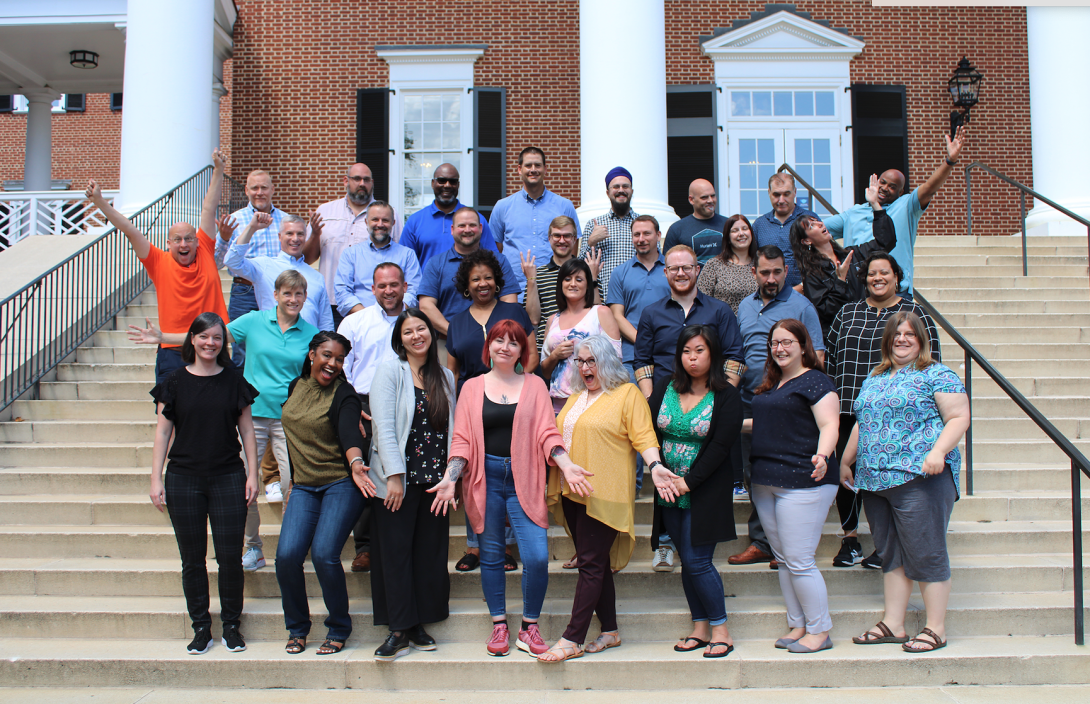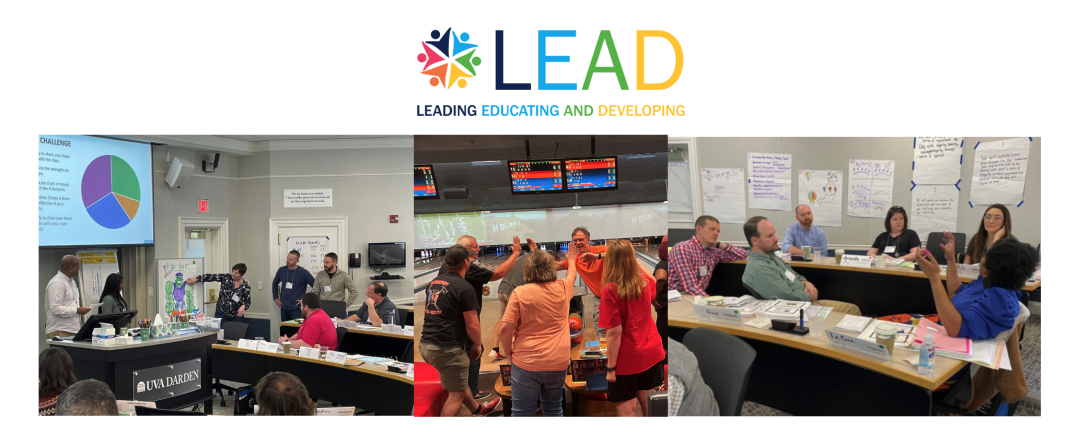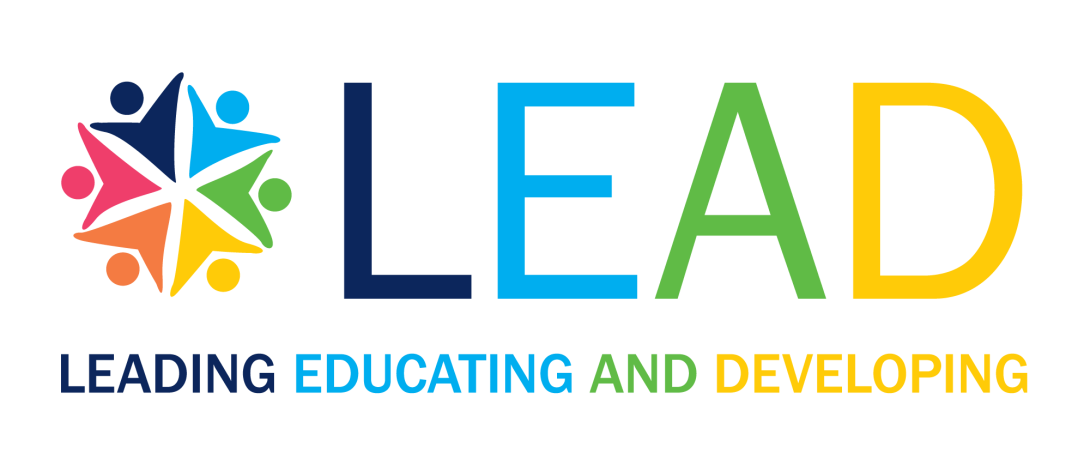LEAD: Leading, Educating and Developing

Leading, Educating, and Developing (LEAD) is a dynamic and engaging one-week residential leadership development program designed for local government department heads, supervisors, and rising stars.
Apply Today
EXPLORE THE PROGRAM
- About
None of the ideas about leadership are really new. Our programs are special because of 3 things – context, environment, and connection.
The context is exclusively based in the world of local government. Instructors and facilitators are either local government practitioners (still working or recently retired) or subject matter experts that fully understand the world of local government.
There is great effort in deliberately creating a safe learning environment. This is a shared responsibility between participants, instructors, and facilitators. This environment encourages speaking up, asking for help, being candid about mistakes and failures, putting the human first over the employee, and continuous support.
Connection is at the heart of who we are as people and leaders. Work is rarely completed alone and relationships are paramount. In LEAD, there is an emphasis on the strong skills needed for building and maintaining relationships. There are often lifelong connections and networks built at LEAD.
What Today's Leaders Face
The world of the public manager and leader is evolving at a speed that challenges even the most robust organizations.
- Local governments are continuously being asked to do more with less.
- Federal and state support is declining.
- Citizens are demanding a more caring, responsive government.
- New technology is revolutionizing communication.
To respond to these forces, our local governments must become laboratories for a new style of organization - one grounded in basic democratic values and guided by a collective vision of community-building and empowerment.
To take our communities confidently into the future, public leaders and executives must adopt a proactive approach to change both inside the public organization and outside in the community. They must invest the time and resources required to create and maintain a continuously improving, learning organization.
- Program Details
LEAD programs consist of 30-40 participants. All classes are sponsored by the University of Virginia's Weldon Cooper Center for Public Service and take place in person at the Darden Business School in Charlottesville, Virginia.
What LEAD Offers
LEAD programs provide local government leaders essential skills they can directly apply in their organizations to make positive change. In our new LEAD programs, participants will
- Examine, discuss, and apply the most relevant and powerful leadership practices, with focused discussions on the distinct and complex experiences of local government leaders
- Leave the LEAD session with a clear roadmap of the concepts learned in the program that can be applied to their organizations immediately
- Develop interpersonal skills and community and organizational leadership skills
- Build skills and awareness through team engagement, including developing coaching techniques, an understanding of how key experiences have shaped leadership styles, and empathy for others gained through attentive listening
- Develop a deeper understanding of inclusive leadership through sessions specifically focused on diversity, equity, and inclusion
- Experience a learning environment that is highly interactive (less than 20% lecture), engaged and application-based, with every session including a concept to learn, a local government example, and an application exercise. The environment is safe, supportive and built on trust and vulnerability, which allows for a nonjudgmental, open exchange of ideas and experiences.
- Dates, Fees, Key Details & Cancellation Policy
Upcoming Program Dates
- October 5 - 11, 2024
- November 9 - 15, 2024 (includes Veterans Day)
- March 1 – 7, 2025
- April 5 – 11, 2025
Additional 2025 dates to come.
The LEAD fee is $5,500 for 2024. The fee includes instruction, lodging, most meals, and materials. A 10% discount is available for members of the Virginia Institute of Government. Payment in full is due 60 days before the start of the program.
Information You Will Receive in Advance of Program
Shortly after you receive your LEAD welcome email, we will send you:
- Materials to help you plan your visit, including hotel and parking information; details on getting to Charlottesville whether it is by plane, train, bus or car; and recommendations for places to visit while you are here.
- Program schedule that includes meeting times and places.
- Additional information about meals, required evening activities, and other details, like meeting etiquette, attire, as well as recommendations for getting the most out of the LEAD experience.
- Pre-work to do in advance to better prepare for your experience.
Cancellation Policy
If you cancel more than 2 weeks in advance of the program start date, you will forfeit half of the tuition cost. No refunds can be made within 2 weeks of the start date. However, substitutions may be made with our advance approval. We greatly appreciate notification ASAP of any need to cancel.
PROGRAM CURRICULUM
- Exploring the Heart & Soul of Public Service
Doug Walker, Deputy County Executive, County of Albemarle, VA
Goals:
- Understanding of the roots of public service going back to the Athenian oath
- Practitioner example of how Albemarle County used this activity in creating and defining their values
- Reminder of the value of public service
- Write a version of the Athenian oath that is reflective of your group’s core beliefs about citizenship and public service
Description:
Public service is a calling. Leadership is getting people to own and mobilize around collective values. In this session, discover how powerfully public service and leadership can come together.
- Emotional Intelligence
Kaki Dimock, Chief Human Services Officer, County of Albemarle, VA
Goals:
- Define what EQ is and why it matters at work
- Broaden your awareness of the role your emotions play on the job, in your profession, and at your organization
- Define and develop each of the four EQ skills| Self-Awareness, Self-Management, Social Awareness and Relationship Management
- Discuss real-world examples and experiences – what works, what doesn’t and what to do next time
- Identify your current level of emotional intelligence (strengths and weaknesses) and where to focus your development
- Complete your own EQ development plan to include one EQ goal and specific EQ practice strategies that will help you achieve this goal
Description:
Emotional intelligence (EQ) is not about being nice, nor is it about suppressing emotions; it is a proactive approach to managing emotions to achieve better results – in regard to your relationships as well as business goals. Put simply, emotions drive behavior and behavior drives performance. Successful leaders leverage this knowledge to achieve greater leadership impact.
- Psychological Safety
Molly Harlow M.S., VIG Assistant Director – Leadership Development
Goals:
- Explore the 4 stages of psychological safety and their importance in creating engagement and motivation
- Learn about one locality’s use of psychological safety to increase performance
- Create a plan to apply psychological safety to your leadership role
Description:
Amy Edmundson (Harvard) defines psychologically safety as “a shared belief held by members of a team that the team is safe for interpersonal risk taking”. Crack yourself open personally and examine your own values, assumptions, and behavior. The goal is to help you see the current state clearly and then figure out how you can take the next steps to transform your team’s culture and performance by increasing the level of psychological safety. Both individually and as teams, we have the next step of progress to make.
- Leadership At All Levels: A Positive and Productive Work Culture through Inclusive Leadership and Employee Engagement
Nancy Olivo PhD, IPMA-SCP, Organizational Performance Manager, City of Hampton, VA
Goals:
- Expand their knowledge and tools to enhance engagement
- Discover how to use clarity and competence to create leaders at every level
- Consider the use of Leadership Teams and Process Improvement Teams as approaches for practicing inclusive leadership to improve organizational performance
- Develop specific action steps to put in place to impact the work culture and performance through employee engagement and inclusive leadership
Description:
Using the latest research on employee engagement and David Marquet’s approach for turning followers into leaders, participants will develop action steps for applying these concepts to their work as leaders.
- Communication for Inclusive Leadership: Challenging Conversations for Diversity, Equity, and Inclusion
Karen Conrad, M.Ed., Karen Conrad and Associates, LLC and Antoinette Allen,
PH.D., Chief Storyteller and Founder of Two Cups of TLC, LLCGoals:
- Learn to integrate diversity into all organizational processes
- Effectively engage in conversations that are inclusive and respectful requiring leaders to understand their own perspective and the perspective of others without judgement
- Explore crucial conversations skills and practice having difficult conversations using a 5-step equity model
Description:
Today’s leaders are expected to integrate diversity into all of the organizational processes. In order to do this, leaders must be able to effectively engage in conversations that are inclusive and respectful. This requires leaders to understand their own perspective and the perspective of others without judgement.
This session offers participants the opportunity to explore crucial conversations skills and practice having difficult conversations using a 5 step equity model which could expand their own mindset. This expansion benefits the leader, their team, and their organization.
- Leading Change: It's All About People
Molly Harlow M.S., VIG Assistant Director – Leadership Development
Goals:
- Introduction to change and transition fundamentals
- Explore barriers to change, such as, resistance and learn how to develop critical mass necessary for successful implementation
- Discuss and assess transition stages employees go through and develop strategies to facilitate desired outcomes
Description:
This session is designed to enhance leaders’ understanding and abilities to more effectively lead change and transition among employees and teams. The session specifically focuses on the interpersonal dynamics related to organizational change, as well as providing information and skills related to understanding and leading teams effectively through the organizational change and transition process.
- Submerged History Tour: Raised/Razed Film
Jordy Yager, Jefferson School African American Heritage Center, Director of Digital Humanities
Lorenzo Dickinson, Founder and Owner, Maupintown Media
Andrea Douglas, Executive Director, Jefferson School African American Heritage Center
Goals:
- Use UVA, the City of Charlottesville, the County of Albemarle, and the city of Durham, NC as a case studies for addressing racial history in communities
- Open dialogue around race, equity and inclusion in communities
Description:
We will visit the Jefferson School African American Heritage Center for a viewing of the documentary and discussion.
- Focusing on Performance through Strategic Alignment
Kristy Shifflett, Chief Operating Officer, County of Albemarle, VA
Goals:
- Broaden the understanding of organizational change
- Determine how organizations can accomplish their strategic goals. What systems and processes must be established/changed?
- Review the challenges and progress the PMO has taken in Albemarle County
- Create a “greenhouse” for building the productive capacity of organizations
- Explore how organizations know their strategic goals. How does the organization manage priority setting?
- Apply the Albemarle County model to your high performance change work
Description:
Managing change is one of the most challenging area for leaders. Explore the model from Albemarle County learning from their failures and successes, so you can improve your ability and your organization’s ability to manage change.
- A Study in Leadership, Co-Leadership and Power Partnerships
John H. Whitlow, Ph.D., JHW Consulting Services and Marc Carraway, Scuffletown Consulting, LLC
Goals:
- Evaluate a musical performance by Scuffletown in relationship to the concepts associated with Power Partnerships
- Discuss the collaborative roles of Leader/Co-leader in Power Partnerships
- Gain an understanding of the use of the 4 Complementary Power Skills in leadership partnerships
- Apply the information discussed in the program to the leader/co-leaderships within your organizations
Description:
To engage participants in a learning program that promotes their understanding related to developing effective power partnerships, and to have them apply this information to power partnerships within their own organizations.

Join us Today!




